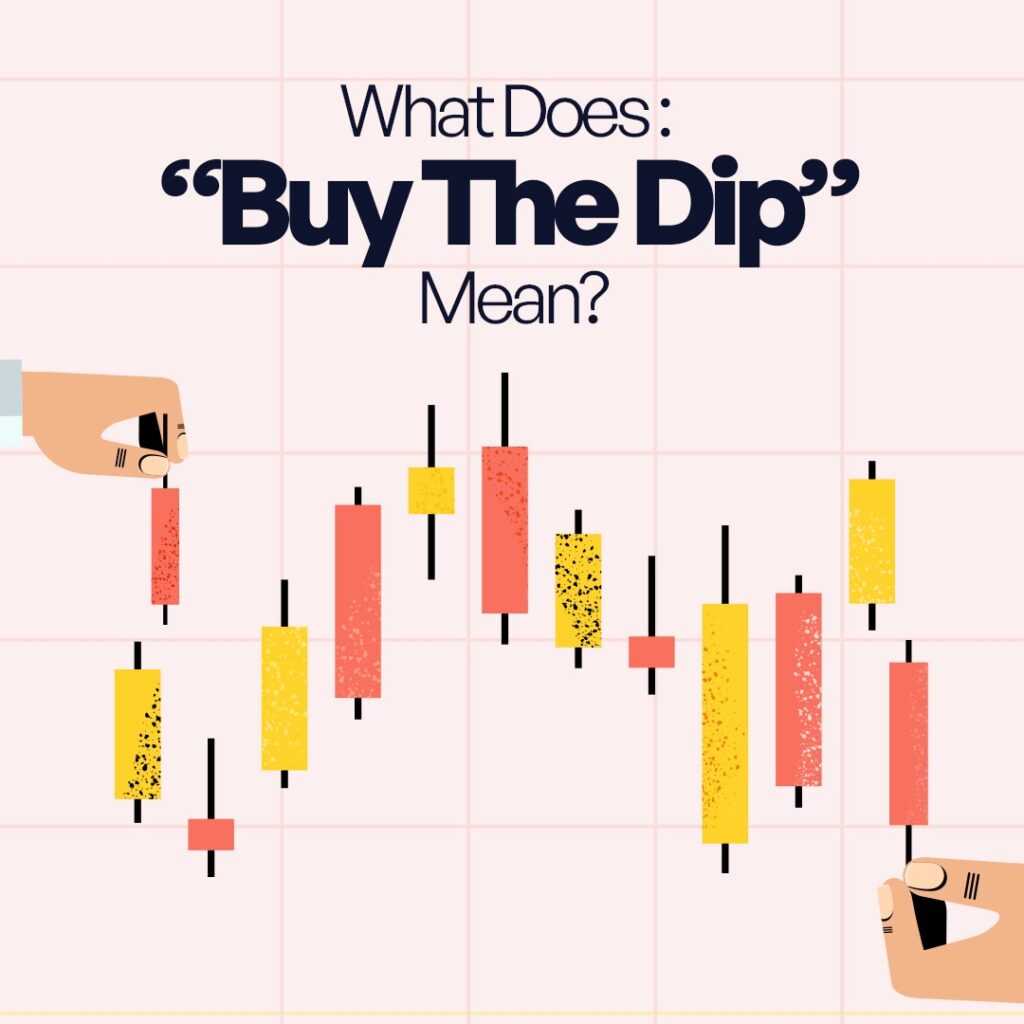Buy low, sell high!…Buy the dip!
Let’s say you have finally taken the tentative step into the exhilarating world of stock investing, and you’re prepared to experience the highs and lows of the market. With your map of stock prices armed as your guide, suddenly experience unexpected drops that leave you gripping your seat!
And then you hear some experienced investors saying, “Buy the Dip!”
And you are wondering what does buy the dip mean?
Well, seat tight because in this post, I will help you understand what it means to buy the dip in the stock market. But before I dive right into it, let’s look at what a dip means and factors that can lead to a stock market dip.

What Does Dip Mean in Stocks?
DIP means a Drop in Price.
This simply means there is a decline in the value of a particular stock in the financial market.
For example; Let’s say Apple stock was trading for $1000 per share and in today’s market, it’s currently trading $850 per share. That basically means there is a dip in the stock. Dips are a natural and common occurrence in financial markets and they often create an opportunity for you to buy at low prices.
What Causes the Stock Market to Dip?
Dips occur due to various factors, here are some common factors that contribute to stock market dips:
- Economic reports such as GDP growth, employment, inflation, and interest rates, can significantly lead to a dip in the stock market. Negative or unexpected data may lead to concerns about the health of the economy, triggering a sell-off in the stock market.
- Market sentiment – Fear, uncertainty, or negative perceptions about the future can lead to a decline in buying activity, causing stock prices to fall.
- The financial performance of individual companies can impact their stock prices. If a company reports lower-than-expected earnings or issues a profit warning, it can lead to a decline in its stock value and potentially affect broader market indices.
- Changes in interest rates. Higher interest rates may lead to decreased corporate profits and lower stock prices.
- Market speculation and trading activities. Rapid buying or selling by traders, hedge funds, or institutional investors can contribute to short-term market volatility.
- Global events –natural disasters, public health crises (as witnessed with events like the COVID-19 pandemic), and other global events can have widespread economic implications, affecting the stock market.
- Technical factors, such as trading volumes, moving averages, and chart patterns, can also influence market movements.
What Does it Mean to Buy the Dip?
“Buy the dip” means purchasing stocks during its downturns with the expectation that their value will increase in the future.
It’s essential to understand that stock market dips are part of the inherent volatility of financial markets and they are always seen as a temporary decrease. While they can be unsettling, they also present opportunities for you to invest in stocks at lower prices or reassess your investment strategies.
However, successful investing involves staying informed about market conditions and making decisions based on a careful analysis of both the short-term and long-term outlooks.
Read: What Does “Bid and Ask” Mean in the Stock Market?
Is It Good to Buy the Dip?
The former adage “buy low, sell high” describes the essence of buying the dip. Buying the dip isn’t a bad idea, however, it’s essential to approach buying the dip with caution and a well-thought-out strategy.
You have to conduct thorough research, assess the reasons behind the dip, and consider the long-term potential of the stocks in question. In this scenario, timing and discipline are key, don’t just jump on the offer rather take enough time to carry out a proper investigation on the stock.
Pros and Cons of Buying the Dip
Pros of Buying the Dip
- Discounted Prices: Buying a high-quality stock at a low rate is one of the most apparent advantages of buying the dip. When the market experiences a downturn, many stocks may be undervalued, presenting a chance for you to buy at a discount.
- Long-Term Growth Potential: Buying during a dip enables you to position yourself for potential long-term gains. If the fundamentals of a stock or the overall market remain strong despite a temporary decline, and you are patient enough to wait, you will benefit from the eventual recovery.
- Diversification Opportunities: By strategically buying during downturns, you can diversify your portfolio and capitalize on opportunities in sectors that have experienced temporary setbacks.
- Income from Dividends: If you are an income-focused investor, buying stocks during a dip can enhance the yield of your investment. As stock prices decline, dividend yields may increase, providing you with the potential for higher income when compared to purchasing the same stocks at higher prices.
Cons of Buying the Dip
- Risk of Further Decline: While buying the dip can lead to profitable opportunities, there is no guarantee that the decline has reached its bottom. Stocks may continue to fall, leading to additional losses for investors.
- Market Timing Challenges: Timing the market is notoriously difficult. Identifying the exact point at which a stock or the market hits its lowest point is challenging, and investors may end up buying too early or too late.
- Temporary Market Conditions: Some market dips are a result of short-term factors or market corrections, and they may not necessarily reflect a fundamental change in the economy or the performance of individual stocks. Investing based solely on short-term market movements can lead to reactionary decisions.
- Psychological Stress: Volatility in the market can be emotionally taxing for investors. Buying the dip requires you to be courageous and have the ability to withstand short-term fluctuations without succumbing to panic selling.

Conclusion
Understanding and navigating dips is a critical skill you need in the ever-changing stock market environment. While market fluctuations can be unsettling, they also create opportunities for those who can discern the difference between a temporary dip and a more profound downturn. By staying informed, conducting thorough research, and maintaining a disciplined approach, you will not only weather the storm but also thrive during market dips.
To enjoy an easy stock investment journey kindly download our Troveapp today!



